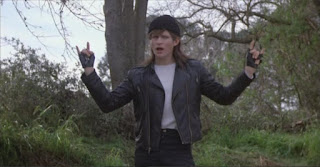Ready Player One (the book) came out in 2011, at the high-water mark of the “nerd as cultural force” phenomenon. At the time, G4 was still going strong and Chris Hardwick had released a self-help book with a cover featuring Hardwick brandishing the word “nerd” written on his knuckles, promising to teach you “how to reach the next level (in real life).” Gamergate hadn’t happened yet, and there was still a widespread assumption that to be a “nerd” was to be sensitive and thoughtful, if obsessive and socially awkward. There were signs that this assumption was wildly misguided even then, especially if you’d spent any time actually hanging out with the obsessive and awkward. Discussing the culture’s failings at the time, a game developer friend of mine said the trouble with these consumer-as-identity folks was that they can “categorize but not synthesize.”
This describes Ready Player One to a T. Its story celebrates the ability to retain pieces of pop culture ephemera, but even in lionizing characters who devote their entire lives to it can’t come up with any plausible explanation of why this might be good. Even when depicting ways that it might be bad it seems blind to its own implications. It’s a movie where the main character delivers a stirring speech about all the friends he’s found in the virtual reality video game world — It’s even helped him find love! — at which his audience stands rapt in the streets, Spielberg-faced in agreement — Yeah! We have lots of virtual friends now too! — seemingly unconscious of the fact that they already had 20 potential real-world friends standing two feet away from them, if they’d only taken off the VR headsets and said hello. The film makes a half-hearted attempt to address the analog world (“The best thing about reality is… it’s real” is an actual line), but it’s so transparently tacked on that it only serves to further expose the creators’ disinterest in the world outside games.
The most damning critique I can give Spielberg is that even while he’s enough of a virtuoso to get me invested in someone else’s video game, he can’t identify the crushing void at the center of this narrative. He comes off a brilliant craftsman and a mediocre thinker.












